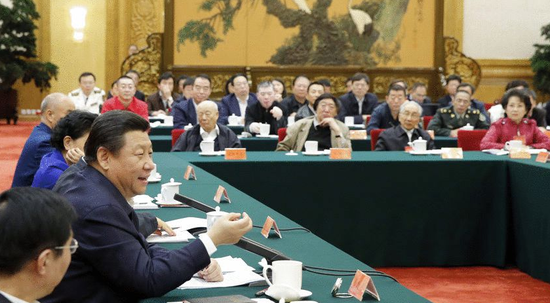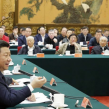
Xi Jinping Consolidates Power While Presiding Over Tilt Toward Ultra-Conservative Ideals
Publication: China Brief Volume: 15 Issue: 21
By:

Even as President Xi Jinping underscored China’s commitment to reform and globalization during his high-profile trips to the United States and Britain over the past two months, the Fifth Generation leader has masterminded a pronounced shift to conservative ideals that are reminiscent of the Mao Zedong era. Xi, who is also General Secretary of the Chinese Communist Party (CCP), has posited Communism as an “attainable goal” of the Party. He has revived Chairman Mao’s dictum about the Party’s tight control of literature, the arts and all creative works. Additionally, just-released regulations on party discipline have reinstated Lenin’s theory of “democratic centralism” by forbidding party members to “groundlessly criticize major policies.”
Xi, a princeling (a reference to the offspring of party elders) who has vowed to “ensure that the red heaven and earth [of the CCP’s founding fathers] must never change color,” has shocked liberal academics and businessmen by openly calling on cadres and party members to “attain the goal of Communism” (CCTV News, July 12, 2013). Xi’s exhortation came in the form of an address he made earlier this year to county-level cadres who were attending courses at the CCP Central Party School. “We should not think that Communism is ethereal and unattainable,” Xi said. “The reason why we are developing socialism with Chinese characteristics is to diligently work toward [the realization of] Communism” (Study Times, September 7). Xi has apparently gone against one of the best-known teachings of Deng Xiaoping, who famously declared in the early 1980s that China was “at the early stage of socialism.” The chief architect of China’s reforms also added that socialism was a “long-drawn-out period” that could last more than 100 years. A victim of the ultra-conservative policies of Mao Zedong, Deng was an unabashed advocate of the idea of “taking remedial lessons in capitalism.” This was a reference to the fact that many of Mao’s disasters originated from the Great Helmsman’s decision to “skip capitalism” by taking a “great leap forward” from feudalism to socialism (Qiushi , August 15, 2014; People’s Daily, February 4, 2014).
Despite Xi’s ironclad control over the media and the Internet, a number of academics and public intellectuals have raised alarm over Xi’s turn toward Maoist beliefs. Real estate businessman and vocal Internet personality Ren Zhiqiang made an indirect appeal to Xi not to go back to the old road. Ren said that people in his age group—who were ardent followers of Mao’s call to accomplish Communist goals during the Cultural Revolution (1966–76)—“had been cheated for decades” by utopias evoked by the Great Helmsman (Global Times, September 23; China Youth Daily, September 21). Even bolder were comments made by Cai Xia, a professor at the Central Party School. In an article titled “Taking a leftward turn or retrogressing is equivalent to distorting the ideals of Communism,” Cai noted that the CCP must uphold Deng’s edict about “upholding the basic line of the early state of socialism.” While the professor did not mention Xi by name, she cited another of Deng’s famous dictums: “Our major task is to combat leftist tendencies [in ideology],” using Chinese communist parlance for Mao’s ultra-radical excesses (Hong Kong Economic Journal, October 9; Aisixiang.com, September 25).
Equally significant is Xi’s restoration of the spirit of Chairman Mao’s Talks at the Yan’an Forum on Literature and Art in May 1942. The full text of the President’s October 2014 Talk at the Forum on Literature and the Arts—which amounted to an unqualified eulogy of Mao’s views—was released by official media earlier this month, a full year after it was originally given. To appreciate the rationale behind Xi’s reinstatement of Maoist standards, it is instructive to examine the message of one of Mao’s most-cited addresses. Mao indicated that not only writers and artists but intellectuals and party members in general should subsume their individualism under dangxing (党性; literally “party nature”; generally speaking, the values and requirements of the party). As Mao put it: “There is in fact no such thing as art for art’s sake, art that stands above classes, or art that is detached from or independent of politics… Proletarian literature and art are part of the whole proletarian revolutionary cause; they are, as Lenin said, cogs and wheels in the whole revolutionary machine.” [1]
Despite the passage of several decades, Xi’s demands on artists and intellectuals are similar to those of Mao: “to nurture and put into practice core values of socialism with Chinese characteristics.” Moreover, Xi says that patriotism is the “deepest, most fundamental and most eternal core socialist value.” The Party boss urged writers and men of letters to take patriotism as “the leitmotif of their artistic creation” and to “guide the people to establish and uphold the correct views of history, the people and the country.” Xi’s insistence that writers and artists focus on “the Chinese experience” testifies to CCP censors and propagandists’ view that the creative community must not fall for the “subversive” ideas of the West. To ensure “literary and artistic workers” will not go astray, Xi argued that “we must strengthen and improve the party’s leadership over art and literature.” The General Secretary called upon cadres working in culture and propaganda departments to do a better job of helping writers and intellectuals to “correctly grasp the relationship between dangxing and the nature of the people, [and] the relationship between [the correct] political stance and creative freedom” (Xinhua, October 15; People’s Daily, October 15).
Xi’s reassertion of the Maoist—and Marxist—views on creativity is consistent with his advocacy of Communism as the highest goal of the CCP. As Jilin University Professor Guo Yonghu put it, the Talk at the Forum on Literature and the Arts has “further enriched and deepened Marxist theories of literature and the arts.” “Xi has pushed forward to a new stage the theories on art and literature of socialism with Chinese characteristics,” he declared (CNTV.cn, October 24). Other academics, however, are convinced that what Xi is after is tighter control over ideology and the intelligentsia. Li Xigen, a Professor at City University of Hong Kong’s Department of Media and Communication, said Xi’s remarks signaled the president’s anxiety to exercise tighter ideological control. “It is a sign that Xi wants to have more control over the arts, and through that, more control over ideology” (South China Morning Post, October 21).
Even more indicative of Xi’s apparent attempt to transform the party-state apparatus into a Maoist yiyantang (一言堂; “one-voice echo chamber”) are new rules on “political discipline” published late October by the Party Central Committee and the Central Commission for Disciplinary Inspection (CCDI). The CCDI’s “Code on Disciplinary Punishments” (纪律处分条例) lists infractions within the areas of “politics, organization, corruption, lifestyle, [relations with] the masses and workstyle.” Most significant are regulations warning the party’s 88 million members not to use the Internet, books and publications, TV appearances or forums and conferences to engage in “wangyi (“groundless criticisms”) of major policies of the party leadership and in disrupting the party’s concentrated unity.” They are also forbidden from “assembling factions within the party and forming cliques… [so as] to nurture the influence of individuals.” Other no-nos include playing golf, leading a luxurious lifestyle and “inappropriate sexual relations” (Xinhua, October 22; People’s Daily, October 22).
The latest regulations have fleshed out General Secretary Xi’s earlier instructions about observing “political rules” (政治规矩). In a speech in early 2015, the General Secretary urged cadres and party members to have a “strict understanding of political discipline and political rules” (People’s Daily, January 16; Xinhuanet, January 13; China Brief, August 18). Equally significant is that the new codes are geared toward effectively enforcing Xi’s concern about “comprehensively governing the party strictly.” (This dictum is part of the doctrine of the “Four Comprehensives”—“Comprehensively build a moderately prosperous society; comprehensively deepen reform; comprehensively govern the nation according to law; and comprehensively govern the party strictly”—which is considered to be President Xi’s major contribution to the canon of socialism with Chinese characteristics). [2] According to CCDI Deputy Secretary Zhang Jun, the reason for a stricter codification of party discipline is that “existing party regulations can no longer meet the requirements of comprehensively governing the party strictly under new circumstances.” “Some new outcomes of [policy] practice need to be consolidated in institutional format,” he added (Hubei Daily, October 26; People’s Daily, October 26).
The new regulations have raised the eyebrows of liberal scholars in Beijing. Chen Jieren, a researcher at the Chinese University of Politics and Law, argued that the clause about “groundless criticizing major policies could result in suppressing democracy within the party…Since the CCP Constitution has given members the right to criticize the central leadership…the new code could [itself] be an infringement of the Party charter.” Beijing-based authority on Communist Party history Zhang Lifan also expressed qualms about this stricture. “It is difficult to specify what constitutes ‘groundless criticism’…Party members’ freedom of expression may be adversely affected.” Zhang noted the new rules targeted not only liberals but also ultraconservative Party members who were opposed to market reforms (Ming Pao [Hong Kong], October 23; HKTVB News, October 22).
At a time when Xi is tightening his grip on power, enforcing harsher disciplinary punishments and the restitution of Maoist norms are potent weapons for marginalizing real and potential enemies. At an address to the Fourth Plenum of the CCP Central Committee late last year, Xi laid into cadres who “scheme to form factions and cliques” by means including “groundlessly criticizing the zhongyang (central party authorities) (Xinhua, January 15; Beijing Youth Daily, January 12). A good example of a political foe being nailed for “groundlessly criticizing” central policies is the disgraced Party secretary of Hebei Province, Zhou Benshun. A former secretary-general of the Central Political-Legal Commission, Zhou is regarded as a key protégé of former Politburo Standing Committee Zhou Yongkang (unrelated), who received a life sentence last June for corruption and misuse of power. Yet Zhou Yongkang’s biggest blunder seemed to be forming an anti-Xi clique within the Party. (South China Morning Post, June 13; Radio Free Asia, June 12). Zhao Kezhi, who succeeded Zhou as Hebei Party boss in late July, told his colleagues that one of Zhou Benshun’s mistakes was “going against party discipline” and “making groundless criticism of central policies” (Phoenix TV, October 25; Guancha.cn, August 12). Given that the momentum seems to be going the President’s way, cadres and party members who disapprove of his overweening power grab are apparently keeping mum so as to avoid being accused of casting aspersions on central edicts. There seems little doubt, however, that as with much of his Machiavellian maneuvers the past three years, Xi is boosting his clout at the expense of the restoration of values associated with the excesses and lawlessness of Chairman Mao.
Dr. Willy Wo-Lap Lam is a Senior Fellow at The Jamestown Foundation. He is an Adjunct Professor at the Center for China Studies, the History Department and the Program of Master’s in Global Political Economy at the Chinese University of Hong Kong. He is the author of five books on China, including “Chinese Politics in the Xi Jinping Era: Renaissance, Reform, or Retrogression?”
Notes:
1. See Mao Zedong, “Talks at the Yan’an Forum on Literature and Art,” in Selected Works of Mao Tse-tung Online
2. For Xi Jinping’s explication of the “Four Comprehensives,” see “What has Xi Jinping’s series of talks discussed about the ‘Four Comprehensives’?” People’s Daily, May 20, 2015.





